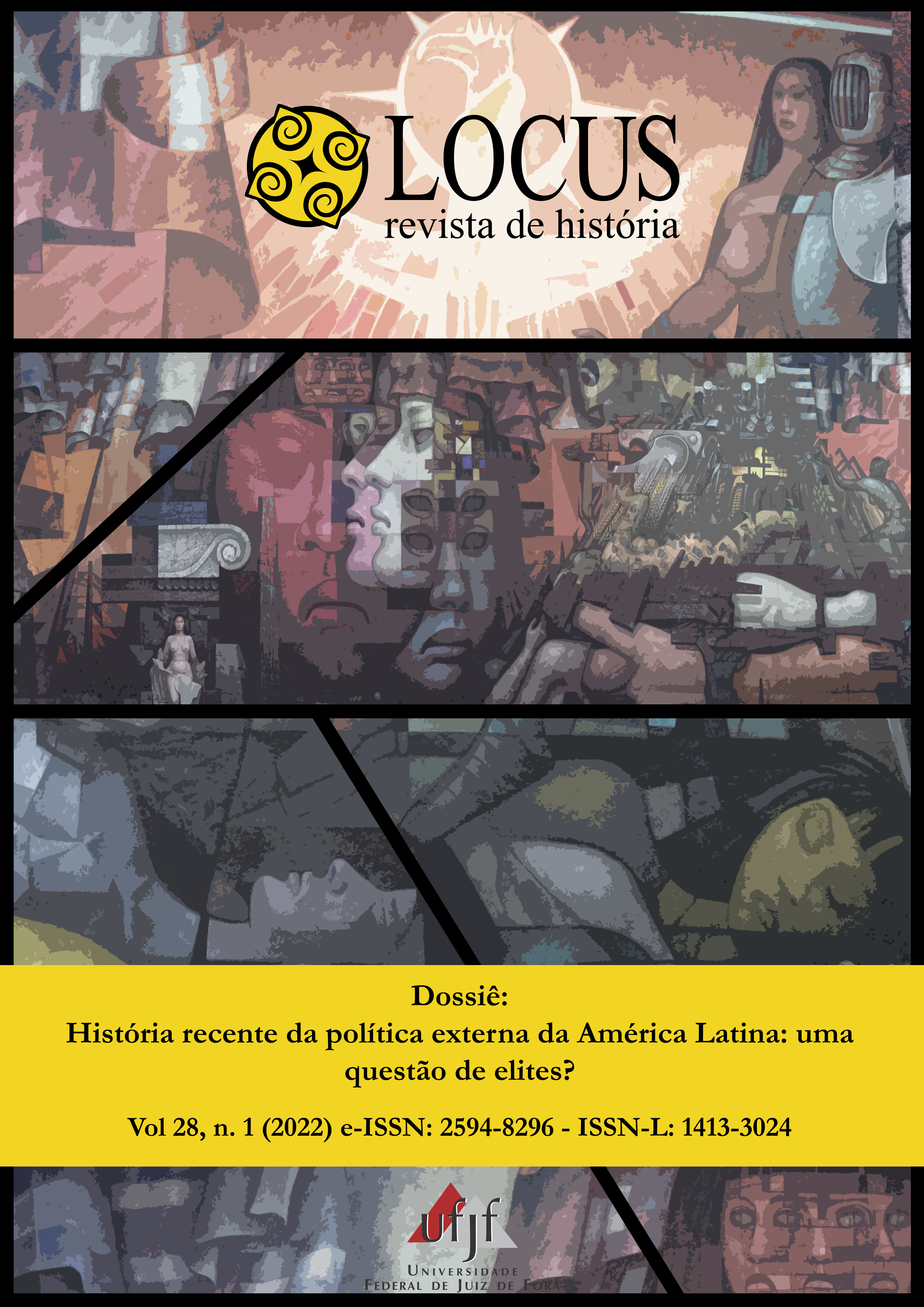Published 2022-07-05
Keywords
- Second World War,
- Soviet historiography,
- Warsaw uprising
How to Cite
Copyright (c) 2022 Moisés Wagner Franciscon, Dennison de Oliveira

This work is licensed under a Creative Commons Attribution 4.0 International License.
Abstract
Through the bibliographic survey of the historiographies of the Western allies and
the official Soviet historiography, we sought to highlight the transformations and contentious
interpretations provided by both sides during the Cold War and beyond this for one of the
episodes that announced the new reality of a combined Cold War replacing the ongoing conflict.
The exchange of accusations and inversions of narratives, if contained at first, led the
historiographic works of the subsequent decades. Its conduction allowed the elaboration of
justifications for the dominant geopolitical framework. Poland's fate remained unchallenged by
the reality of the forces'; disposition, but not in their morality. It allowed the accusation of the
treacherous and authoritarian nature formulated by both sides to the political-economic-
ideological rival, concealing the mutually imperial interests.
Downloads
References
- Academia das Ciências da URSS. A Grande Guerra Pátria do povo soviético e a actualidade. Moscou: Nauka, 1985.
- Beevor, Antony. A Segunda Guerra Mundial. Rio de Janeiro: Record, 2015.
- Bezimenski, L. O militarismo alemão com/sem Hitler. Rio de Janeiro: Saga, 1967.
- Cienciala, Anna. “The Foreign Policy of Józef Piłsudski and Józef Beck, 1926-1939: misconceptions and interpretations”. The Polish Review, Illinois, 56, n. 1-2 (2011): 111-151.
- Chun, Clayton. The Doolittle Raid, 1942. Oxford: Osprey, 2006.
- Churchill, Winston. Memórias da Segunda Guerra Mundial. Rio de Janeiro: Nova Fronteira, 1995.
- Cohen, Stephen. War with Russia? From Putin & Ukraine to Trump & Russiagate. 2019. Nova York: Hot Books, 2019.
- Davies, Norman. O Levante de 44. Rio de Janeiro: Record, 2006.
- Deschner, Günther. O Levante de Varsóvia. Rio de Janeiro: Renes, 1975.
- Farrell, Brian. Churchill and the Lion City. Cingapura: NUS Press, 2011.https://doi.org/10.2307/j.ctv1ntggr
- Forczyk, Robert. Warsaw 1944: Poland’s bid for freedom. Oxford: Osprey, 2009.
- Gilbert, Martin. A Segunda Guerra Mundial. Rio de Janeiro: Casa da Palavra, 2014.
- Grechko, A. Missão Libertadora das Forças Armadas Soviéticas na Segunda Guerra Mundial. Rio de Janeiro: Livraria Ciência e Paz, 1985.
- Hart, Basil Henry Liddell. As grandes guerras da história. São Paulo: IBRASA, 1999.
- Ieremeev, Leonid. A União Soviética na II Guerra Mundial. Rio de Janeiro: Revan, 1985.
- Jvostov, V., e L. Zukok. História Contemporânea. Rio de Janeiro: Vitória, 1961.
- Kershaw, Alex. Dez decisões que mudaram o mundo. São Paulo: Companhia das Letras, 2008.
- Kotkin, Stephen, e Jan Gross. Sociedade incivil. Rio de Janeiro: Objetiva, 2013.
- Kulkov, E., O. Rjechevski, e I. Tchelichev. A verdade e a mentira sobre a Segunda Guerra Mundial.Lisboa: Editorial “Avante”, 1985.
- Leffler, Melvyn; Painter, David. Origins of the Cold War: an international history. Nova York: Routledge, 2005.
- Lukas, Richard. “Russia, the Warsaw uprising and the Cold War”. The Polish Review, Champaign, 20, n. 4 (1975): 13-25.
- Maiski, I. Quién ayudó a Hitler. Moscou: Progreso, s/d.
- Montefiore, Simon Sebag. Os Románov, 1613-1918. São Paulo: Companhia das Letras, 2016.
- Munhoz, Sidnei. Guerra Fria: história e historiografia. Curitiba: Appris, 2020.
- Munhoz, Sidnei. Guerra Fria: um debate interpretativo. In: Silva, Francisco Carlos Teixeira. O século sombrio: uma história geral do século XX. Rio de Janeiro: Elsevier/Campus, 2004. p.261-281.
- Poliakov, L., A. Leltchuk, e A. Protopopov. História da Sociedade Soviética. Moscou: Progresso, 1979.
- Ponomariov, B., org. Historia del Partido Comunista de la Unión Soviética. Moscou: Ediciones en Lenguas Extranjeras, 1962.
- Pospelov, P., org. Istorria Velikoi Otecestvennoi Voiny Soiuza. Moscou: Voyenizdat, 1960-65. 6v.
- Pospelov, P., org. La Gran Guerra Patria de la Unión Soviética. Progreso: Moscou, 1975.
- Prazmowska, Anita. Civil War in Poland, 1942-1948. Houndmills: Palgrave, 2004. https://doi.org/10.1057/9780230504882
- Rasor, Eugene. Winston S. Churchill, 1874-1965. Westport: Greenwood, 2000.
- Revunenkov, V. História dos Tempos Atuais. Rio de Janeiro: Editorial Vitória, 1961.
- Reynolds, David. In command of history. Penguin: Londres, 2005.
- Riábov, Vassili. O grande feio do povo soviético e do seu exército. Moscou: Progresso, 1983.
- Schwartzman, Simon, org. Estado Novo: um auto-retrato. Brasília: UnB, 1983.
- Shtemenko, S. El Estado Mayor Central durante la Guerra. Moscou: Progreso, 1985.
- Smith, Joseph. The Cold War, 1945-1965. Nova York: Basil Blackwell, 1989.
- Snyder, Timothy; Brandon, Ray. Stalin and Europe: imitation and domination, 1928-1953. Oxford: Oxford University Press, 2014. https://doi.org/10.1093/acprof:oso/9780199945566.001.0001
- Stalin, José. La Gran Guerra Patria de la Unión Soviética. Buenos Aires: Partenon, 1946.
- Tchuikov. O Fim do Terceiro Reich. Moscou: Progreso, 1980.
- Volkogonov, Dmitri. Stalin. Rio de Janeiro: Nova Fronteira, 2004.
- Werth, Alexander. A Rússia na Guerra. Rio de Janeiro: Civilização Brasileira, 1966.
- Zabecki, David. World War II in Europe: An Encyclopedia. Nova York: Routledge, 1999.
- Zaloga, Steven. The Polish Army 1939–45. Oxford: Osprey, 2013.
- Zamoyski, Adam. Varsóvia, 1920. Record: Rio de Janeiro, 2013.
- Zhilin, P., org. La Grand Guerra Patria de la Unión Soviética: 1941-1945. Moscou: Progreso, 1985.
- Zhukov, G. K. Memorias y meditaciones. Santiago: Zig-Zag, 1970.

